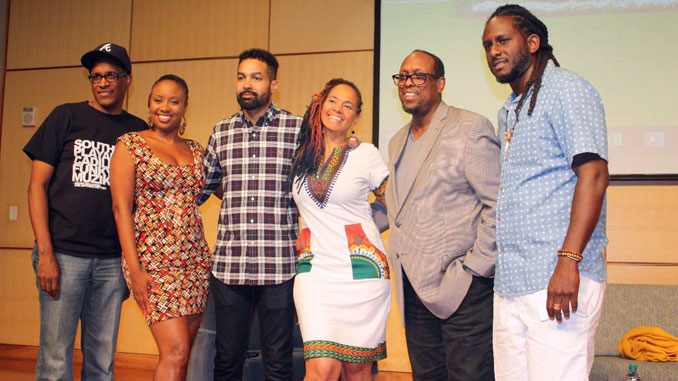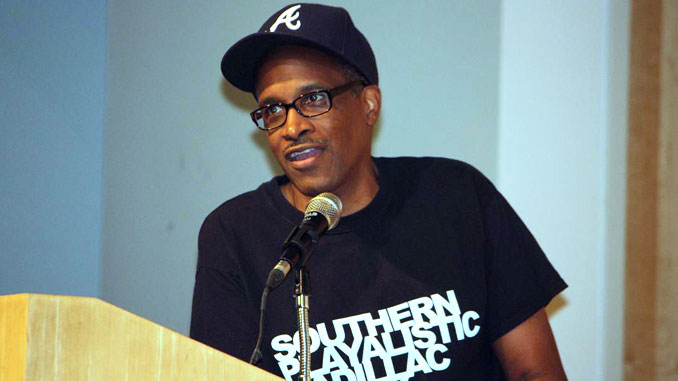
Lacee Ancar Data News Weekly Contributor
The perception of what is masculine is present in all communities, however, in the Black community, Black masculinity is defined in the media, in the community and even in the household. Black masculinity in the media is often portrayed as an emotionless “thug” with anything resembling more moderate features as being too “girly” or feminine. However, in an era of the Me-Too Movement, more men say they must lead conversations around Black masculinity where the subject was taboo before.
“When I first started calling myself a Black feminist, there was always a push back or a surprise,” said Mark Anthony Neal, the author of “Looking for Leroy: Illegible Black Masculinities.” “However, I feel like that is less so now.”

The idea of Black men being feminists may seem foreign to some, Neal said, but that is slowly changing. From politics to art and activism, the Black community has also begun its own work to dismantle toxic masculinity and its impact not just on women and children but also on men and boys.
“It’s beyond time that we sit down and talk about something that has been happening in our community for a long time,” said Dillard University President Dr. Walter Kimbrough who hosted a public panel on Oct. 10th with Neal, Poet Jessica Care Moore, Black Feminist Scholar Dr. Treva Lindsey, and Hip Hop Artist and Activist Jasiri “X” Smith, who moderated the conversation.
According to Neal, the reason why Black men are starting to identify more with feminist movements is that they understand that the movement was never about bashing Black men and generalizing all men, but to help Black men understand the role they can play in empowering others, even while still being a man. Neal credits influential leaders such as former first lady Michelle Obama and writer and commentator Roxanne Gay in helping make conversations around Black women’s experiences to become more mainstream.
“We’ve raised a generation of men and boys now who’ve understood that Black feminism was never about attacking Black men, but actually helping us better recognize our humanity,” Neal said.
The Me-Too Movement has also put Black women’s experiences back in the forefront. Poet and Activist Jessica Care Moore, who is the Executive Producer of Black Women Rock! said the current times have forced men to reconsider how they interact with women on a regular basis, not just only in more violent cases like sexual assault.
“I have been cat-called my whole life, I’ve dealt with men yelling at me from across the damn street,” Moore said.
Women and girls rarely spoke about this behavior, she added, because they observed it all their life.
“I was raised in a very masculine household, my mother was very quiet in comparison to my daddy,” Moore said.
She acknowledged that what made her father a good male role model for her was how her father supported her and allowed her to develop as a young woman.
“But I also wasn’t violated by my father. I was allowed to be a girl, and nobody violated my space,” Moore said. “I was able to come into womanhood unscathed and that made a difference in my ability to love men,” Moore said.
The fetishization of Black women is only one outcome of toxic masculinity. Both high levels of homophobia and transphobia in Black culture also stem from widely held notions of Black masculinity, according to Dr. Treva Lindsey, an Associate Professor in the Department of Women’s Gender and Sexuality Studies at Ohio State University in Columbus, Ohio.
“In order to get closer to being a positive Black community, we have to address the things that keep us from one another,” Lindsey said
Black queer and trans people are displaced from their homes early on because of homophobia and transphobia they experience from family, and it can be directly traced to toxic masculinity, Lindsey said of her studies in this area. Growing up, young boys are told certain behavior is unacceptable but never given a reason why.
“When I was younger, I always knew I was gay. I just was afraid to talk about it because I was taught it was not okay by my father,” said Joe Brown III, a senior at Xavier University of Louisiana. “I grew up around a typical toxic male environment, where I was taught not to cross my legs or walk a certain way, and I always wondered why it was never okay to do those things.”
Through art and activism, the panelists shared that the Black community can begin to identify what is toxic behavior, how as a culture this is perpetuated, and how to move forward as a community.
“It’s important to note that different people recognize toxic masculinity in different ways,” said Khaelyn Jackson, a Dillard sophomore student who attended the discussion. “And that can cause some confusion as to how to address it, and what actions we can take to tackle it.”
The panelists agreed that the conversation should not just end with sexual assault but expand to conversations around the treatment of Black women on a daily basis, and homophobia and transphobia, which they admit are still difficult and polarizing conversations in the Black community.
“Homophobia, transphobia, [and] ableism can often pull us apart. So, when we’re organizing movements, it’s important to keep in mind who is the most vulnerable in our communities,” Kimbrough said.
Recommended For You.



Be the first to comment